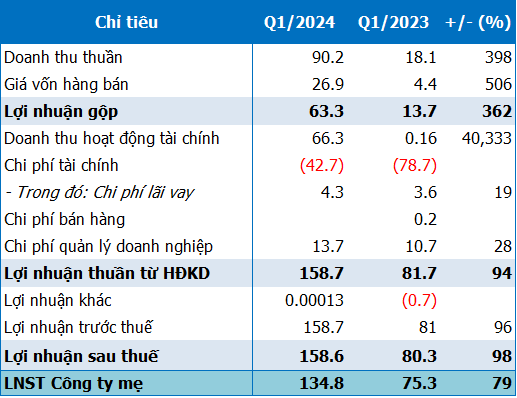The State Bank states that by the end of 2023, the outstanding loans for the real estate sector will be around 2.75 quadrillion VND, an increase of about 6.75% compared to the beginning of the year.
Within that, credit for real estate business loans reached a 22% increase, accounting for about 26% of the total lending in the real estate sector.

Credit for real estate gradually opens up.
A series of solutions from the Government and the State Bank in the past have been effective, creating conditions to remove difficulties for real estate projects. Thanks to that, the lending rate for real estate business operations at some banks such as HDBank, Techcombank, VPBank, SHB, MSB, MB, TPBank increased compared to the end of 2022. (Banks recording a decreased proportion of real estate loans include: VIB, Kienlong Bank, PGBank, VietBank, BVBank.)
Techcombank has the highest proportion of real estate business loans on total outstanding loans among publicly detailed banks, with a rate of 35.22% as of December 31, 2023, compared to 26.44% in the same period the previous year.
VPBank ranked second with a proportion of real estate loans at 19%, compared to 14.39% at the end of 2022.
Real estate loans at VietBank also reached 19%, but this rate decreased by 1% compared to the end of 2022.
Other banks also saw a significant increase in the proportion of real estate loans, such as SHB increasing from 8.33% to 15.45%; MB increased from 4.91% to 7.49%.
MSB recorded a slight increase from 8.75% to 8.96% of total outstanding loans, TPBank increased from 6.31% to 7.12%, while this rate at Saigonbank remained at 6%.
According to a report by the State Bank, credit growth in 2023 is 13.5%. This is a great effort of the whole industry in the context of credit increasing weakly in the first three quarters of the year.
In the context of the lowest interest rates for loans in the past few years, the State Bank has set a credit growth target from the beginning of 2024 for banks at 15%.
In the February investment outlook report, VNDirect Securities Company said that “tight knots” are gradually loosening, which is expected to help the real estate market recover from the second half of 2024.
In terms of capital, lending interest rates have decreased and become more accessible for investors, and can support the demand for home purchases. VNDirect also expects the net profit margin of real estate businesses to recover in the coming quarters.
Consumer credit for real estate continues to decrease, reflecting the caution of buyers. However, the average mortgage interest rate is currently about 11%, down from the peak of 13-14% per year.
The expectation of a decrease in interest rates will improve the demand for real estate purchases, thereby supporting the cash flow of investors. We believe that the residential real estate market has passed the most difficult period and will show a clearer recovery from the second half of 2024,” VNDirect analyst group evaluated.
To facilitate the flow of credit into the real estate market, besides the detailed plans set by businesses themselves, some real estate businesses believe that the banking sector needs to be more “open” in terms of credit granting conditions. Specifically, in terms of procedures, it is necessary to simplify documents, shorten the approval and credit granting time to less than 1 month. In addition, it is necessary to further reduce interest rates, especially for businesses with good credit history and feasible business plans.
In addition, businesses also propose that the Government extend the restructuring period for loans; continue to allow the use of 34% of short-term capital for medium-long-term loans (instead of reducing it to 30%); relax room for banks participating in real estate market restructuring; extend the loan period for sectors directly related to real estate.
Experts believe that “expanding” credit is very necessary at this stage, to support real estate businesses, which are already in a difficult situation and are preparing to face the “storm” of corporate bond maturity in 2024.











































